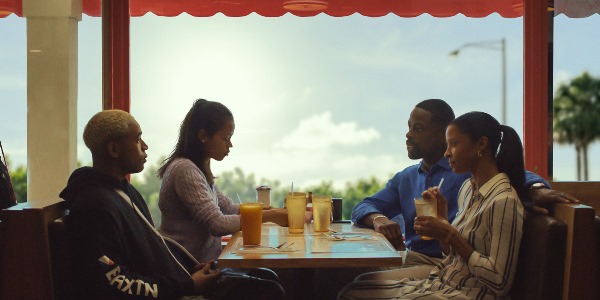
The best and worst aspect of Waves is the potential revealed in its first half. I confess that I walked into the theater with dubious feelings, not having been especially attracted by the preview. But within the first 10 minutes or so, I was engaged and surprised. It struck me that the director had found an authentic and vibrant approach to his subject, and though I resisted some of its aspects, such as the overabundance of music and the filmmaker’s desire to have adolescence look like an endless party whenever possible, I was ready to accept that some fine films have had horrible trailers (for instance, Wind River).
Director Trey Edward Shults places the viewer firmly in the consciousness of Tyler Williams, a teenage boy from an affluent African American family that seemingly has it all. He’s a star of the wrestling team; he has a beautiful girlfriend, Alexis (Alexa Demie); he works hard at school; and he has tons of friends who are always down to party. His senior year is full of the gorgeous vistas of South Florida, music is always playing, there is always some activity that must be urgently attended to, and Tyler would rather die than miss any of it.
Cracks in his façade begin to emerge. Tyler’s father puts him under immense pressure—the pep talks and the weight training they engage in together appear bounded up in a stringent concept of masculinity, and it’s to Shults’s credit that this is never overstated. We sympathize with them both, but we still sense that something in this relationship will hurtle toward disaster.
Tyler’s life begins to come apart when he injures his shoulder so badly the doctor recommends emergency surgery and that he never wrestle again, and also when Alexis reveals that she’s pregnant. His approach to both situations is denial; he continues as an athlete as though nothing is wrong, and he assumes his girlfriend will get an abortion.
At this point, I was struck by how convincingly Shults and actor Kevin Harrison Jr. had created the main character. These days, when male filmmakers chooses to make a film that addresses masculinity, they tend to examine its toxic aspects in increasingly distanced ways, as though attempting to prove that they, the artists, are not like these men (see The Art of Self-Defense or Damsel, for examples). In Waves, Tyler’s struggles are deeply rooted to his emotional life, which is anything but distanced from the audience. We relate to emotional core of his struggles and witness the way his father has raised him has perhaps not prepared him to deal with high stress situations. I was curious to see how Tyler would deal with the issues facing him, and looked forward to it.
That, as it turns out, was not Shults’s plan. Instead, there is an event so melodramatic it is impossible to take seriously, and Tyler ends up running afoul of the law and out of the narrative, and so the focus shifts to his sister, Emily (Taylor Russell). Shults invests about an hour to her story, and is content to render her adolescence in the blandest terms possible.
While her brother is in jail, her journey to finding her way consists of a maddening list of milestones: first boyfriend; first time smoking weed; first time having sex; first genuinely open conversation with father, with a gorgeous sunset to accompany it. Instead of rendering her as distinctly as Tyler, Shults gives her an array of hollow generalizations, and everything else that follows falls flat. There’s an attempt to depict Tyler’s father confronting the mistakes he made with his son, which is portrayed so obviously a preadolescent could have written it.
In abandoning Tyler, Shults not only lets go of the emotional core of his movie but also unwittingly tells yet another story where a young black man goes to jail, when I assume it was his goal to explore black masculinity specifically. I wish he had stuck with Tyler and his struggles as opposed to leaving him to hollow clichés. That would have been the film to see.






Leave A Comment